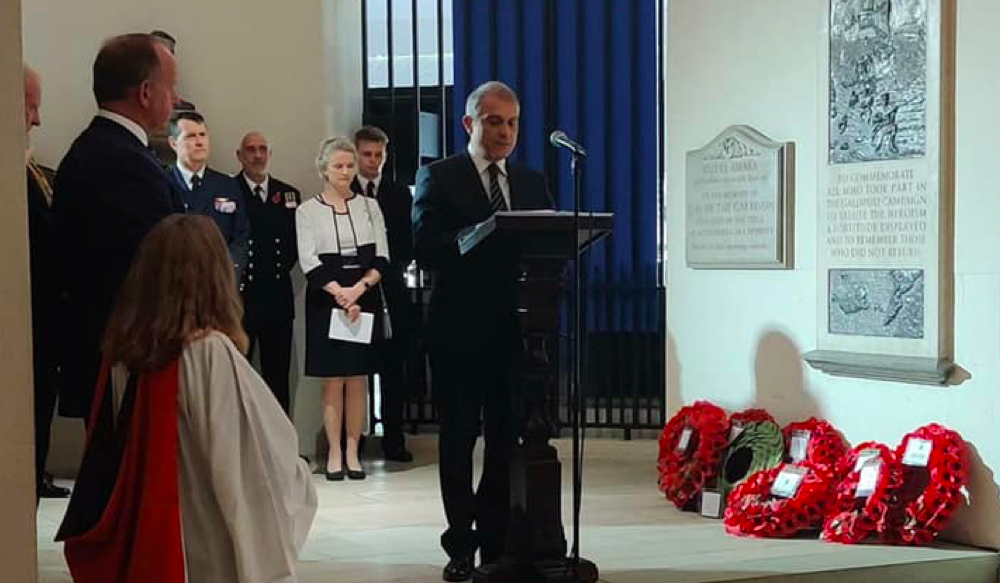The Turkish Ambassador Ümit Yalçın took part in ANZAC Day ceremonies in London on Monday, 25 April, to remember the Allied soldiers who fell during the Gallipoli Campaign in 1915.
Ambassador Yalçın attended ceremonies at St. Paul’s Cathedral, the Cenotaph and Westminster Abbey, where he recited the famous words of Mustafa Kemal Atatürk intended to reassure the mothers of the thousands of foreign soldiers who were killed fighting the Turks in Gallipoli and were laid to rest in Turkey.
“Those heroes that shed their blood and lost their lives… you are now lying in the soil of a friendly country. Therefore, rest in peace. There is no difference between the Johnnies and the Mehmets to us where they lie side by side here in this country of ours…
“You the mothers who sent their sons from far away countries wipe away your tears. Your sons are now lying in our bosom and are in peace. After having lost their lives on this land they have become our sons as well,” said Kemal Atatürk, the founding father of Turkiye, after leading the Turks’ heroic defence of their country at Gallipoli.
The Duke and Duchess of Cambridge also attended the service at Westminster Abbey. Prince William laid a wreath on behalf of the Queen at The Cenotaph.
Separate ANZAC Day ceremonies took place across Britain during the weekend, including at Cambridge on 23 April, where the Turkish Air Attaché, Group Captain Serkan Virlan, joined Air Chief Marshall (rtd) Sir Michael Graydon in saluting the fallen.
After the wreaths were laid, Captain Virlan also recited the words of Kemal Atatürk and during his speech, said it was the duty of those present “to teach our kids how horrible wars are”. He also noted how from nearly 500,000 casualties “an extraordinary friendship” had developed between the warring nations at Gallipoli.
The Cambridge service included the national anthems of Australia, New Zealand, Turkiye, and Britain, performed by the Salvation Army band.
Ambassador Yalçın, on the occasion of 🇬🇧 ANZAC Day, attended ceremonies at St. Paul’s, Cenotaph and Westminster Abbey, and recited Atatürk’s words to the mothers of ANZAC soldiers who fell in Gallipoli. pic.twitter.com/Cs5smkfdeG
— TurkishEmbassyLondon (@TurkEmbLondon) April 25, 2022
History of ANZAC Day
ANZAC (short for ‘Australia and New Zealand Army Corps’) Day is an annual day of commemoration and thanksgiving for Australia’s and New Zealand’s soldiers who served and died in wars, conflicts and peacekeeping operations.
The date falls on the anniversary of the Gallipoli Landings on 25 April 1915. Lasting eight months, Gallipoli was one of the bloodiest battles of the First World War (WW1), with heavy casualties on both sides.
On the Allied side the total number of casualties, including those wounded or evacuated for sickness, numbered some 142,000. The Turkish forces lost over 86,000 soldiers, in addition to more than 164,000 wounded.
Both Australia and New Zealand were part of the British Empire, which compelled them to support the British war effort during WW1. The Australian and New Zealand Army Corps came under joint command for the first time in Gallipoli, and became known as the “ANZACs”.
Nearly 9,000 Australians were killed and more than 19,000 wounded in combat with the Turks. New Zealand lost close to 3,000 men, while over 5,000 were wounded. These figures do not include those who died from their physical injuries or mental trauma after the Gallipoli campaign.
Before the coronavirus pandemic, thousands of Australians and New Zealanders would travel to Turkiye each April to take part in ANZAC ceremonies in Gallipoli, where the graves of those who died are meticulously maintained by the Commonwealth War Graves Commission, with the assistance of the Turks.
In the years since the end of the First World War, ANZAC Day has grown and now not only remembers those who died at Gallipoli, but all Australians and New Zealanders who have made the ultimate sacrifice in the service of their countries.





